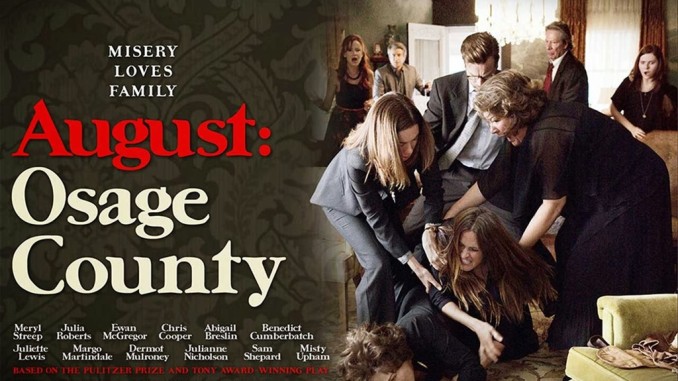
August: Osage County (2013) is a difficult film. Adapted for the screen by Tracy Letts from his own 2008 Pulitzer Prize-winning play and directed by John Wells, it is a drama of family pain leavened with sardonic wit. The various pains on view are the usual sorts of pains of which families are uniquely capable—the self-inflicted, those generationally wielded to exert weakness or power, those traded in vengeance or defense, those hidden until they fester and corrupt—and there is nothing particularly fresh in Letts’ structure; the story owes too-obvious debts to a very long line of much stronger works from Greek tragedy to Chekhov, O’Neill, Albee, and innumerable others along the dramaturgical way. However, Letts is also a highly respected and Tony Award-winning actor, and it is his instinct and talent for depicting the telling human moment, the vivid, idiosyncratic gesture or wrenchingly accurate riff of dialogue, that transcends the sometimes arbitrary and heavy-handed confrontations and compounding revelations. It is largely an actors’ piece, and the cast is excellent.
Set in a large old house on the plains of rural Oklahoma, the story takes up with the death of a sometime poet and full-time alcoholic, Beverly Weston (Sam Shepard). His wife, Violet, is completing treatment for mouth cancer, and has accommodated this challenge by upping what we come to learn is a longstanding reliance on an enormous pharmacopeia of pills. One adult daughter (Julianne Nicholson) is close at hand; the other two (Julia Roberts and Juliette Lewis) arrive from Colorado and Florida respectively for the funeral, as do, from nearer by, Violet’s sister (Margo Martindale) and brother-in-law (Chris Cooper) and their son (Benedict Cumberbatch). Faster than you can say Long Day’s Journey Into Night, the fireworks begin, and thereby hangs the tale.
Violet Weston fancies herself the family Sybil, the truth teller, when in fact she is merely a vile and vicious egotist, so solipsistic that she has no room for anyone else, except as they exist in some very confined corners as nothing more than parts of herself.
Streep is, yet again, astonishing, and for it she won one of her 19 Academy Award nominations. Her capacity for entering and exploring a remarkable range of characters—a rare balance of shrewd intelligence and instinct with technical mastery—continues to grow. A couple of critics have voiced the opinion that the film’s most serious flaw is that the performances, hers in particular, have not been scaled down appropriately from stage to camera. I do not agree. Violet Weston is overblown, reckless, air-suckingly self-involved and spiteful. This person is not only someone you would not want as your mother, she is someone with whom you would not want to spend half an hour. However, what Letts’ toxic matriarchal character affords Streep, one of the most extraordinarily intelligent and dexterous actors working in film, is the opportunity to dredge up from this fiendish example of the most damaging of her ilk—the Medeas, Amanda Wingfields, Sophie Portnoys, the Mrs. Bennets and Gertrudes –shards of understandably wounded, if not excused, humanity. Her Violet, for all her vindictiveness and vulgarity, is in rare moments revealed to be a human being with soft places and bravery, with potentialities abused, mislaid, gone wrong.
Tracy Letts is not Shakespeare, and August: Osage County is not King Lear; but this melodrama of family disorder does earn a rather unexpected degree and quality of catharsis, and that it does so is largely due to Meryl Streep. Her Violet is, appropriately, terrifying and exhausting, but it is actually a quite naturalistic performance—closer in her canon to Silkwood than to The Iron Lady; and there is something in the artistic dimension of Streep’s careful translation of this vitriolic, pathetic harradin, that lifts this experience, at least here and there for minutes at a time, quite nearly to a level of tragedy.
The ensemble is strong. Roberts is smoothly calibrated as the oldest of three Weston daughters, the one most expert (if understandably reluctant) at dealing with her mother’s offenses. We gradually sense her horror at recognizing aspects of herself in the grotesque funhouse mirror that is Violet. Martindale exerts a vivid precision as Violet’s blowsy sister and, as her long-suffering husband, Chris Cooper is at once droll and touching.
Most of us, when we see anything like a Violet Weston coming, go out of our way to avoid her. Streep—ably supported by her fine fellow players—makes us take a long, hard look at this hugely unsympathetic woman, and does so with such surgical expertise and humanity that it reminds us, uncomfortably but inescapably, that not everyone has that luxury.
by Hadley Hury


Leave a Reply